“I have hurt myself so much for this sport and now I am simply not willing to do it anymore.”
Giorgio Minisini, a pioneer for male inclusion in artistic swimming and one of the biggest champions of our sport, is retiring. The 28-year-old announced it today, July 16, in Rome, in an “open-hearted” press conference.
This announcement comes a few days before the start of the Italian Summer Nationals – where he will compete one final time – in Foro Italico in Rome. Coincidentally, it is where it all began, 24 years ago.
It was in Foro Italico that in 2000, following his mother Susanna de Angelis, he saw for the first time Bill May at the Rome Open; Bill who had begun doing synchronized swimming in 1989 when the sport was a female prerogative and, therefore, could not compete in official international competitions.
It was also in Foro Italico that in 2022, he became the first-ever European Champion in the inaugural men’s solo event, and where the Italian anthem resonated for him.
During today’s farewell press conference, Giorgio spoke from the heart as he explained he was retiring to preserve his mental health, and that he preferred “the fear of uncertainty to the certainty of unhappiness.”
“I really wanted the Olympics, and I wanted it so much that I was willing to continue practicing an activity that no longer gave me any pleasure other than knowing that perhaps, at the end of the tunnel, there would be five rings to give meaning to everything.
I found myself wondering what artistic swimming meant to me in the past seasons. And the answers I found were quite clear. I haven’t been well these last few years. That’s nothing new. And the reason for my discomfort is almost entirely in this sport. I started swimming because doing it made me feel alive: it was fun. Then it became a mission, when I saw a good part of the world around me pitted against us who were practicing a sport that they thought wasn’t for us. And without realizing it, season after season, the mission turned into an obsession.
It’s been years since I felt satisfaction in doing this sport, but I couldn’t give up my obsession, not even at the cost of my own well-being: I preferred to feel bad about it rather than give up. But not anymore. I don’t want to trade my well-being for an obsession anymore. I’ve hurt myself so much for this sport, and now I’m simply not willing to do it anymore.”
Trained at first by his mother Susanna and his late father Roberto, an international judge, Giorgio started synchronized swimming at 6 years old, before competing for the first time at 13. Inspired by Bill May, another trailblazer for men in the sport, he pursued his passion alongside his siblings Marco and Diana.
He has not been in the pool for 22 years, often 12 hours a day, every day, only for himself, but also and above all for others, for men like him in artistic swimming.
Only in 2015, World Aquatics (then-FINA) admitted men to the World Championships with the mixed duet. Giorgio was 19 then, and went on to win two bronze medals. His breakthrough came in 2017 at the Budapest World Championships, when he won gold with Manila Flamini.
The peak of his career was in 2022, with two world titles, in Budapest once again, in mixed duet with Lucrezia Ruggiero, and four gold medals at the European Championships in Rome, two in solo and two in mixed duet.
His last medal came just about a month ago at the European Championships in Belgrade, a silver in free solo. But then, many around the pool could already sense that, in a way, he had already made up his mind about his future in the sport.
In late 2022, World Aquatics announced that men would be allowed in the team event at the Olympic Games, starting in Paris 2024. However, neither he nor any other male artistic swimmer will be in the French capital this summer.
“It has been a 22-year journey, and the results are just the culmination, compared to the many battles for inclusion and recognition of this discipline, for a fairer and more transparent sport. I am proud of what we have done and especially of the doors we have opened. I don’t deny that after 22 years, a little fatigue sets in. I’ve always swam with enthusiasm, albeit in a rigid, exclusive environment full of prejudice, but I always thought the sport could change. I always found it absurd that a discipline would want to continue to keep half of humankind out, compared to what it could gain from it.
Despite what he saw around him, Giorgio continued undaunted to believe in his Olympic dream.
“I was certain that that future would come. I felt like a castaway in a stormy sea, but who knew that sooner or later, he would find a happy island. But I didn’t think it would take so long, and I didn’t expect my boat to break down once I spotted the island. So I found myself back where I started and in the same waves as 22 years ago, with a dream pushed back another four years, if not more. My eyes were opened, and I asked myself questions about what artistic swimming meant to me.”
Giorgio was, and should be defined as, much more than his medals or his accomplishments in the pool. His legacy extends far beyond all of that. He has been a role model, advocate, and a source of inspiration for many. Undoubtedly, he encouraged countless young – and old – boys to take up artistic swimming, and to break barriers in the sport themselves, year after year.
In every pool, in every competition, his name always came up when asking fellow athletes who they considered as their role model and favorite athlete. He never failed to show great kindness and patience, no matter how well or badly his own competition might have been going, and to stop to chat with anyone who wanted to.
He never feared using his platform to talk about issues that many still view taboo in the sport. In 2023, he published his book “Il Maschio” where he tackled important topics such as mental health, depression, and his own battles within artistic swimming.
Although he retires from elite, he will continue his great sporting and social commitment with the Progetto Filippide and his mixed duet with Arianna Sacripante. Together they will be in Châlons-en-Champagne in France in August to participate in the artistic swimming competitions of the World AWD Championships.
One thing is certain: artistic swimming has been lucky to have him, and it will not be the same without him. He changed the sport in his country, in the world, for young boys, for athletes with disabilities, and well beyond anything past the small bubble that is the elite world.
“It is one of the things that gives me the most satisfaction, thinking that today a young boy can go to the Olympics fills me with pride, because when I was little I was not allowed to dream of it.”
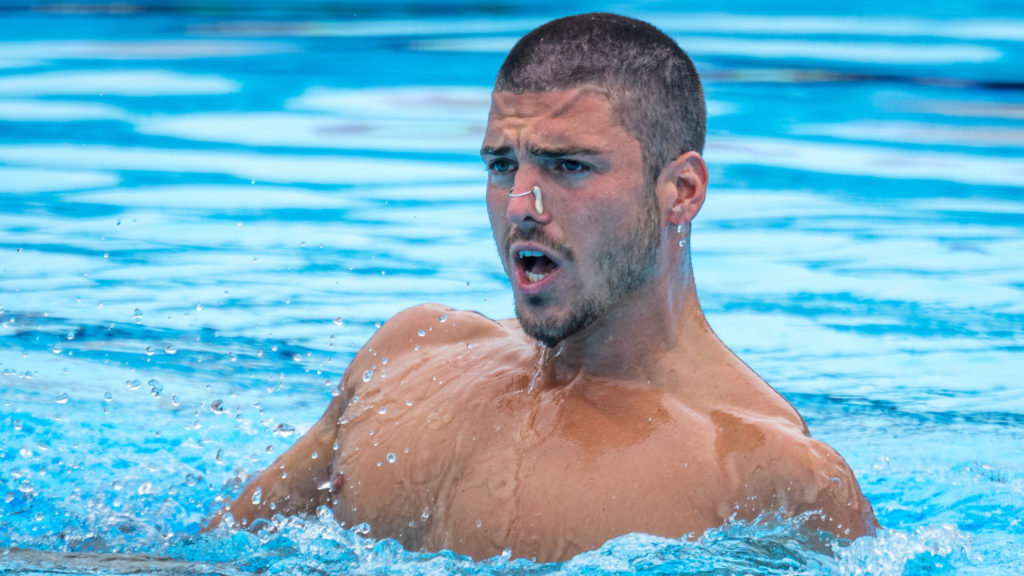
This weekend, Giorgio will only swim in the solo event to close out his phenomenal career. He has prepared something special for his final performance, although he doesn’t want to give it all away yet. Only, he will perform a new routine to a piece of music that he had promised himself would be his last soundtrack.
“Even if I didn’t think I would use it so soon. It will be the occasion to close the circle of these two decades, and to do it in a way that leaves me with a good memory of this journey we have taken together.”
On Sunday, he will compete alongside 10 other male athletes, most younger than him, all – you can bet — inspired by him. Maybe one of them will be in Los Angeles 2028. Everything is possible now, and the credit also goes to Giorgio Minisini.
ARTICLE BY CHRISTINA MARMET
Cover photo: Deepbluemedia
If you’ve enjoyed our coverage, please consider donating to Inside Synchro! Any amount helps us run the site and travel costs to cover meets during the season.

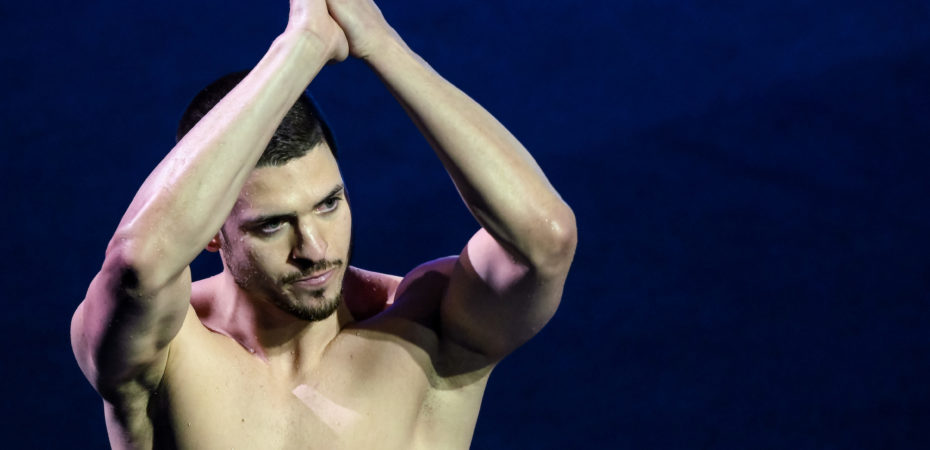
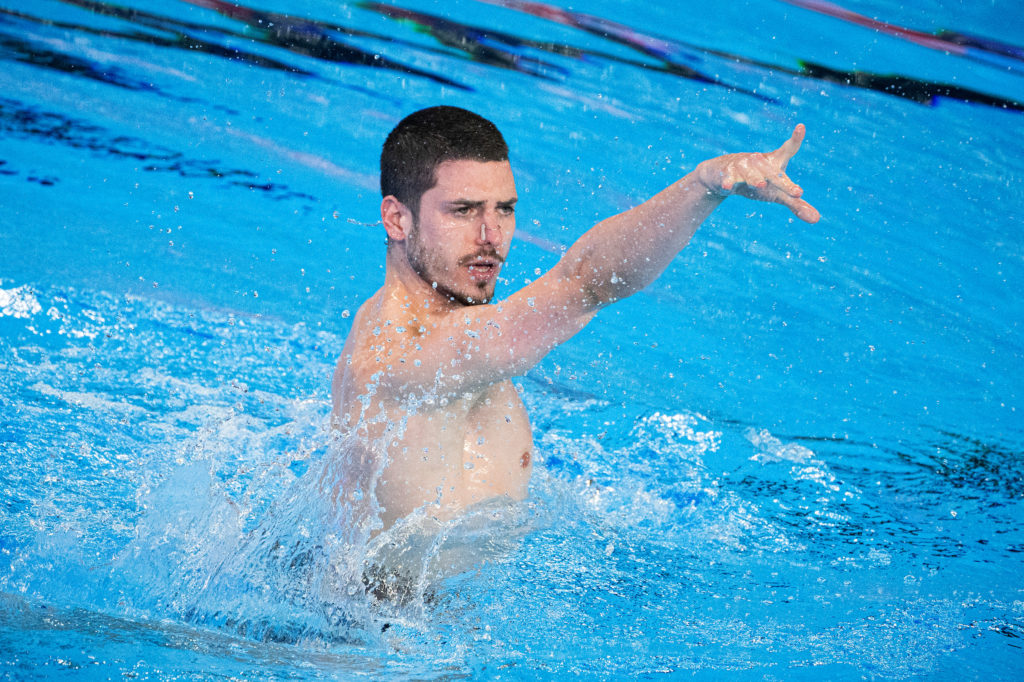
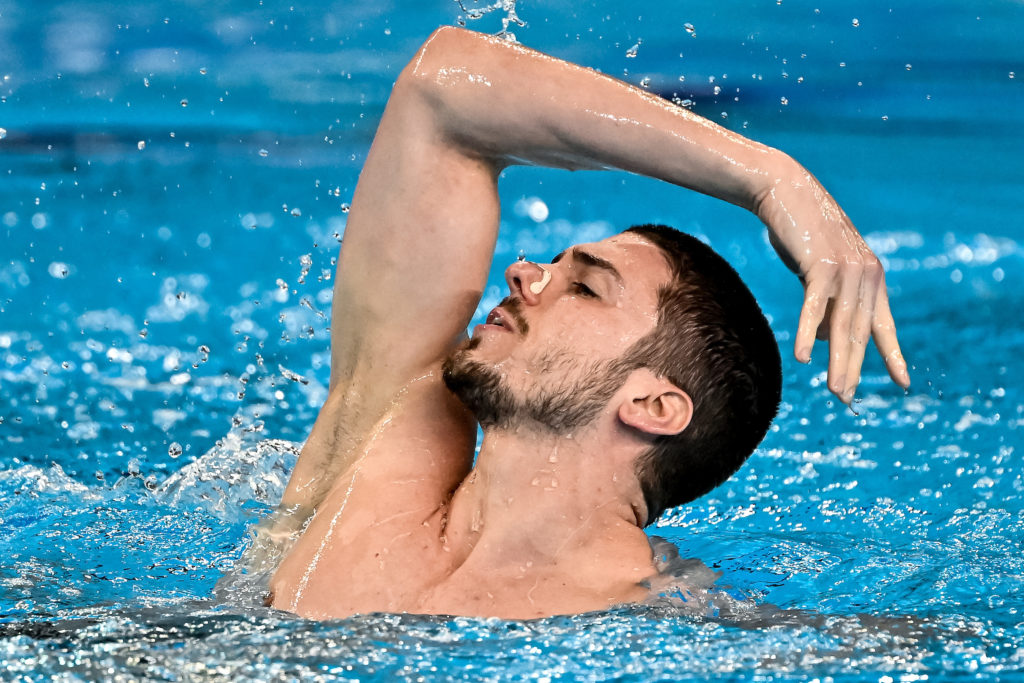
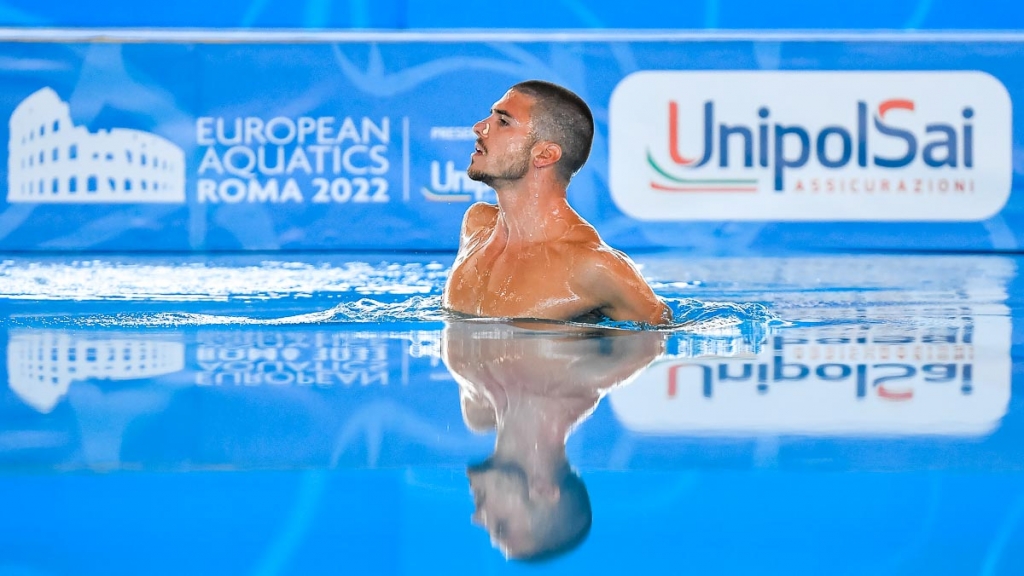
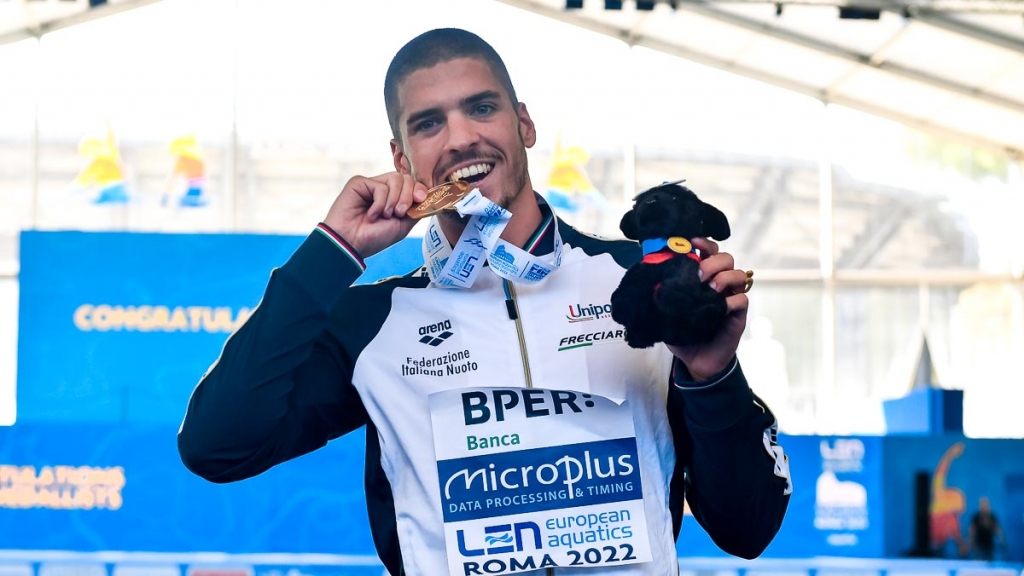
[…] “I really wanted the Olympics, and I wanted it so much that I was willing to continue practicing an activity that no longer gave me any pleasure other than knowing that perhaps, at the end of the tunnel, there would be five rings to give meaning to everything,” Minisini said. […]